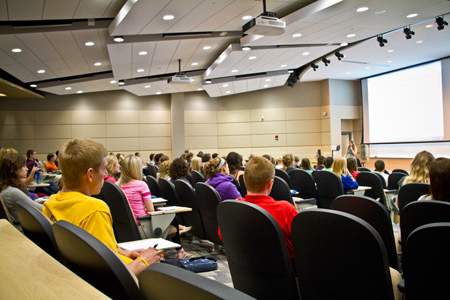Posted 2:14 p.m. Friday, Sept. 9, 2011
It’s a natural question: How much do students actually learn during college? Test results show a strong educational environment at UW-L.
 [/caption]It’s a natural question: How much do students actually learn during college?
The results of a nationally administered test, the Collegiate Learning Assessment (CLA), show that UW-La Crosse is successful in improving students’ skills in critical thinking, analytical reasoning and writing effectiveness during their four years of college.
The difference between the average predicted score for UW-L seniors and their actual average score placed the university higher than 96 percent of the other 144 schools nationwide that participated in the computer-based test.
"The CLA results are a very timely and positive representation of the strong educational environment we have developed at UW-L,” says Kathleen Enz Finken, UW-L provost and vice chancellor for academic affairs.
A random sample of 110 UW-L freshmen and 107 seniors took the test during the 2010-11 academic year. UW-L seniors’ actual average CLA scores were compared with a predicted score based in part on their ACT test results and the average freshmen CLA performance. UW-L senior’s actual average score was above the predicted score and the difference between the two numbers placed UW-L higher than 96 percent of other schools. Evidence from one of the tests three main activities, the Critique an Argument task, shows UW-L education has a lasting impact. Freshmen student performance ranked UW-L within the 56th percentile. But senior year scores moved UW-L to the 89th percentile.
The results are important at a time when some question the value of a college education. A book released by the University of Chicago Press in January, “Academically Adrift: Limited Learning on College Campuses,” uses data from CLA to draw the conclusion that people should be concerned about college education. “We have counter evidence to say UW-L students are performing well — using the same measure,” says Patrick Barlow, university assessment coordinator. “I think the results portray we are doing a good job in developing students’ abilities related to these specific skills.”
A UW-L committee will use the CLA results to help evaluate general education curriculum. Also, the results, combined with other statistics and surveys, contribute to UW-L’s “College Portrait,” an online tool, that can help prospective students and their parents make decisions about where to attend college, says Barlow. This is the second time UW-L has participated in the CLA. The first time was in 2007-08. UW-L value-added scores also made the 96th percentile on that assessment. UW-L will participate in CLA again in two years.
[/caption]It’s a natural question: How much do students actually learn during college?
The results of a nationally administered test, the Collegiate Learning Assessment (CLA), show that UW-La Crosse is successful in improving students’ skills in critical thinking, analytical reasoning and writing effectiveness during their four years of college.
The difference between the average predicted score for UW-L seniors and their actual average score placed the university higher than 96 percent of the other 144 schools nationwide that participated in the computer-based test.
"The CLA results are a very timely and positive representation of the strong educational environment we have developed at UW-L,” says Kathleen Enz Finken, UW-L provost and vice chancellor for academic affairs.
A random sample of 110 UW-L freshmen and 107 seniors took the test during the 2010-11 academic year. UW-L seniors’ actual average CLA scores were compared with a predicted score based in part on their ACT test results and the average freshmen CLA performance. UW-L senior’s actual average score was above the predicted score and the difference between the two numbers placed UW-L higher than 96 percent of other schools. Evidence from one of the tests three main activities, the Critique an Argument task, shows UW-L education has a lasting impact. Freshmen student performance ranked UW-L within the 56th percentile. But senior year scores moved UW-L to the 89th percentile.
The results are important at a time when some question the value of a college education. A book released by the University of Chicago Press in January, “Academically Adrift: Limited Learning on College Campuses,” uses data from CLA to draw the conclusion that people should be concerned about college education. “We have counter evidence to say UW-L students are performing well — using the same measure,” says Patrick Barlow, university assessment coordinator. “I think the results portray we are doing a good job in developing students’ abilities related to these specific skills.”
A UW-L committee will use the CLA results to help evaluate general education curriculum. Also, the results, combined with other statistics and surveys, contribute to UW-L’s “College Portrait,” an online tool, that can help prospective students and their parents make decisions about where to attend college, says Barlow. This is the second time UW-L has participated in the CLA. The first time was in 2007-08. UW-L value-added scores also made the 96th percentile on that assessment. UW-L will participate in CLA again in two years.
